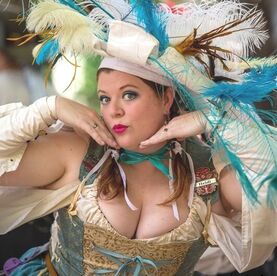Meet Our Villagers
The villagers are the heartbeat of our festival. This colorful bunch of characters are the townsfolk, the merchants, the tradesmen, and anyone that calls Castleton their home. The combination of friendly faces, rich traditions, and natural beauty create a warm and welcoming atmosphere that we love to invite you to! Join us for the festival full of merrymaking and delights! It would be our pleasure to invite you to dance.
Our 2024 Villager Cast
|
Josh Bell.....Leonardo Davinci
Deborah Billingsley.....Alice David Brown.....William Shakespeare Brittany Burdette ......Martha Nash Nathanuel Cloud.....Allyn Pierce Jeff Culey.....Angus Emily Cranford ......Prudence Sterling Bretly Crawford .....Reginald Foulweather Trevor Davis .....Beauregard Tubbins Daisy Gorton .....Cherry Roxanne Grabe-Hilton .....Iris Fable Demi Gray .....Clover Jess Hastings ......Squire Jenn Higgs .....Heidi Eva Hodges ......Mary Kate McBride Nicole Huskey......Lady Audrey Armstrong Emmalea Johnson .....Skylar Penn Kara Koontz ......Millie Miranda Koontz.....Flora Madison Krause ....Walton the Peddler Melanie Light.....Anika Von Hecke Scott Long .....Marquess Shaftesbury Gordon Shumway Tanya Lett.....Sarah Sharpe |
Jacob Lyon ....Rupert Black
Sabrina Manchester.....Quinn Taylor Martinez.....Gretchen Hogarth Dylan McFarland.....Dunmoore McCraicht Kristen Meinert.....Valkyrie Marshal Miller ......Marco Loggia Justice Muskrat .....Klaus Wolf Tim Nowotny .....Tomas Quill Alyssa Reeder .....Sophie Macarete Jay Riggins .....Twizz Michael Riggins .....Baxter Erin Rogers ......Mel Mercer Mary Gertsch-Rollins ......Agatha Kravitz Bruce Sasaki.....Jenga Josie Scott.....Syren Valentine Molly Skocny.....Morgan O'Shiel Damion Stretch .....Count Charlamagne Pickadilly Jasper Stretch ....Marquis of Abbey Road, Albert Hall Kerri Stretch ....Baroness Penelope Featherington Timothy Stretch ...... Lord Percieval Elijah Tootill.....Bradley Rasher Milissa Watson .....Ashleigh McBride Will Wood.....Fyodor |


